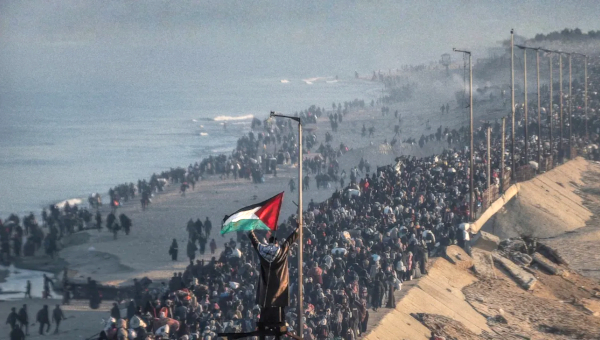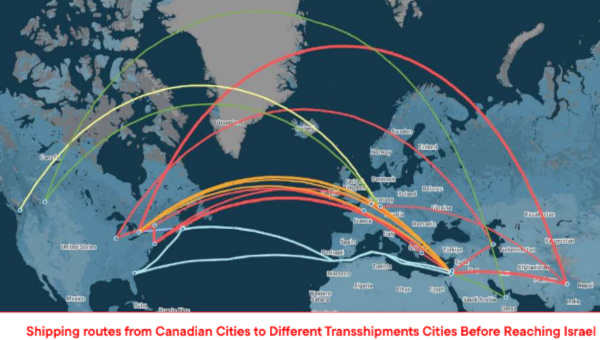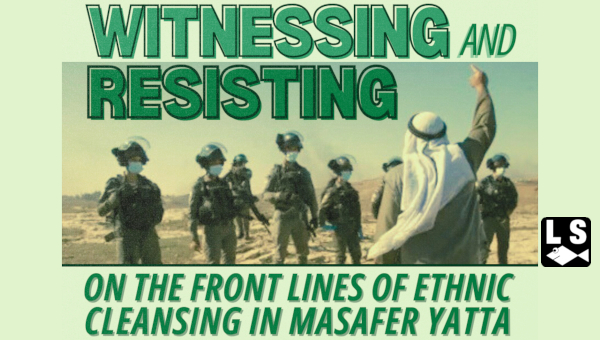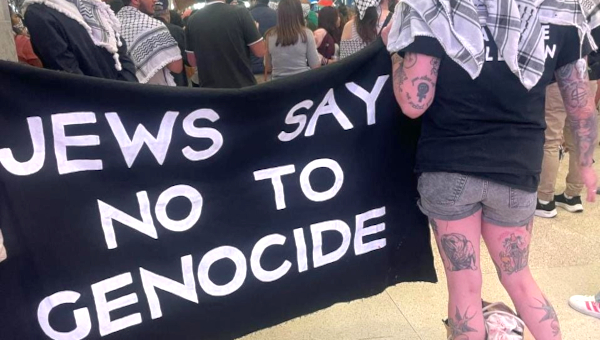Israel’s Genocidal Campaign: The Struggle Continues
The assassination of Ismael Haniyeh only confirms that Israel has no interest in ending its genocidal and terrorist campaign on Gazans, in particular, and Palestinians, more generally. Over 500 Palestinians have been killed in the West Bank (WB) as illegal settlers, backed by the Israeli army and police have extended their capture of more territory. It should be crystal clear by now that Israel’s murderous assault on Gaza is not any ‘unbalanced’ or ‘disproportionate’ reaction to the 2023 October 7 Hamas attack, that liberal and right-wing apologists for Zionist Israel, whether Western or Indian, have tried to make out. That Hamas action has served as the much-awaited excuse for Tel Aviv to carry out its own longstanding ambitions to establish an unchallengeable, but quietly accepted, status as the world’s only remaining settler-colonial apartheid state.
However, it cannot do what some older settler-colonial states did in the New World, namely, physically eradicate the indigenous population to the point where its presence in the colonized territory and its capacity for resistance becomes negligible. The Israeli hope in this brutal war has been to try and accomplish that goal at least in Gaza, since it is much more difficult even in the longer run to achieve this in the WB. So, kill huge numbers including children and women in Gaza so that capacities for future reproduction are significantly lessened. Already, if one counts the number killed, injured, and those estimated missing, mostly dead, because submerged under the rubble, it will amount to over 8% of the Gaza population. The equivalent tally in India would be over a 100 million killed and injured! The second prong of this ethnic cleansing project is to push out as many Gazans as possible to neighbouring countries and elsewhere by cruelly incentivising ‘humanitarian evacuation’ and then preventing, as in the 1948 Nakba, any future return of those displaced.
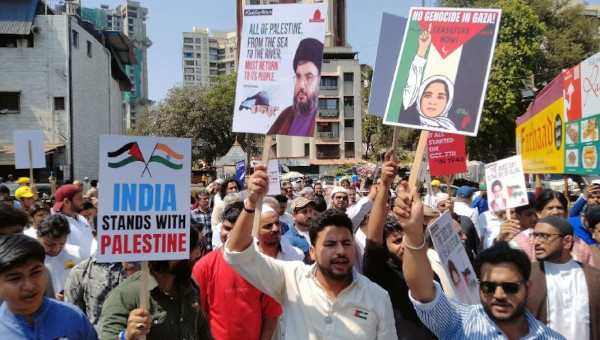
Permanent Ceasefire?
The refusal of Egypt to open the Rafah border and of Gazans to seek evacuation on the scale desired by Israel means it and the US will have to plan for some kind of favourable outcome after this ‘second Nakba’ comes to an eventual end. When this will happen, we cannot yet say. The Hamas leadership was burnt earlier when a temporary ceasefire and partial return of hostages did not lead to the building up of a peace momentum. Unsurprisingly, Hamas now wants an internationally assured permanent ceasefire. It is only the US that can guarantee this but so far has allowed Israel to carry on with its genocidal campaign. Despite the recent Israeli assault on Beirut and the strike on Haniyeh violating Iranian sovereignty, neither Lebanon, Hezbollah, nor Iran appears willing to seriously extend the military conflict beyond existing levels.
As for some kind of post-war plan for Gaza, its basic parameters are not difficult to foresee. First, Israel will, in the name of security, take direct armed control over a large chunk of Gazan territory, making its prison-camp character even more miserable since it will be spatially concentrated and much more densely populated. Second, the future governing structure should be one that eases the way toward future normalisation of relations between Israel and its Arab neighbours, particularly but not only, Saudi Arabia (SA). In view of its larger regional ambitions, this is what the US, even more than the current Israeli government, would want. The US idea would be to have a governing authority that would include representation from some neighbouring regimes (the UAE is certainly open to such inclusion) but also requires the fig leaf of Palestinian representation but excluding Hamas. This could be provided by an Abbas-ruled Palestinian Authority (PA). While the EU provides the single biggest amount of funding to the PA, it is the US that is the main funder of the PA’s security apparatus and the tens of thousands of families in the WB dependent upon such income. It is this that enables President Mahmoud Abbas and Fatah to be the dominant force in the WB despite its deep and growing unpopularity given its role as a faithful sub-contractor for Israeli occupation of the WB.
The China Brokered Deal
The US is disconcerted by China’s political entry in the region but remains the dominant external power there. Beijing may have facilitated an easing of relations between SA and Iran, but the competition between SA and many of the Gulf States with Iran for regional influence is a more enduring axis of tension, and the former states have relied much more on the US as a countervailing force. Similarly, too much should not be made of China’s brokering of a deal to unite Hamas and Fatah and for Hamas and 14 other factions (including Mustafa Barghouti’s Palestinian National Initiative and Islamic Jihad) to become part of the PLO, the primary representative body for Palestinians everywhere. What came out is an agreement to establish a national unity government to block Israel from total future control in Gaza: a unified leadership ahead of promised elections to the PA (the last were held in 2006) currently dominated by Fatah and Abbas. But this is yet another effort at unity among a series of failed efforts including by Russia in February this year.
The Declaration of Agreement is essentially a statement of intent. It has no timetable for completion of proposed measures, and no implementation mechanism has been defined. Indeed, its exercise has been made conditional on a decree by President Abbas who did not head the Fatah negotiation team. Abbas has always been more concerned to retain his dominance in the WB, and then, if possible, to extend his reign to Gaza, which in turn, depends on his maintaining security co-ordination with Israel and being acceptable to the US. The PA and more so Abbas are deeply and increasingly unpopular among Palestinians in the Occupied Territories (OTs) as contrasted with Hamas, which despite its reactionary social-cultural perspectives and programme, is seen as a more genuine resistance force against Israel. While Fatah and Hamas share one common concern which is to block any non-Palestinian Arab body, for example the UAE, from being part of the governing structure in the OTs, hence this Agreement; for Abbas the more important reason was to shore up his and the Fatah-dominated PA’s dramatically declining popularity. In a recent May-June poll in the OTs by the Palestinian Center for Policy and Survey Research, 89% wanted Abbas to resign, and over 60% want the dissolution of the PA and an end to its repressive and corrupt sub-contracting role.
What do the other parties get out of this Agreement whose chances of adequate or meaningful fulfilment are so low? Hamas gets international recognition as an entity with a legitimate stake in future efforts to ‘resolve’ the Palestinian issue. China, which also goes on and on about a two-state solution – the standard diplomatic stance by so many governments to cover-up their refusal to undertake the kind of material sanctions that can really hurt Israel – now gets greater geo-political entry into the region. This can help China’s Belt and Road Initiative (BRI), improve its standing with countries whose oil-exports it needs, as well as gaining a degree of power projection that can annoy the US. Incidentally, China remains the second most important importing country from Israel (the US is the first) and the most important exporter to Israel (the US comes second). So much for any hopes that China will exercise serious, let alone damaging, sanctions against Israel.
Key Lessons
Two key lessons should now become clear. First, few if any of the governments of leading countries seriously care about the sufferings, present and past, of the Palestinian people. What generally and routinely gets greater priority is how, in their respective pursuit of the ‘national interest’, they can best manage their relationship with the Zionist apartheid state of Israel. These countries include India about whose current relationship with Israel more will be said later. As for the Arab world, there is a sharp disjunction between the mealy-mouthed hypocrisies of their governments and the sentiments of their publics, which are strongly pro-Palestinian but unable to seriously influence their ruling elites to behave accordingly. None of the four countries – UAE, Bahrain, Morocco, Sudan – that signed the Abraham Accords, thereby normalising relations with Israel, have rescinded these bilateral peace treaties. Nor have the oil exporting countries of the region sought to use oil as weapon to put economic pressure on Israel’s Western backers.
Second, the tragedy of Palestine is that a remarkable and courageous people have, except for very short periods, never had the kind of leadership they truly deserve! Fatah today is a disaster and the Oslo Accords a sell-out wherein the Palestinian leadership gave up their most important political-diplomatic asset – formal recognition of Israel – for the mere recognition of the PLO as the sole representative of the Palestinian people. Israel never recognized the right of Palestinians to their own independent and fully sovereign state. There was no delineation of what the borders of that state would be; no commitment to, let alone actual, reversal of existing illegal settlements; no negotiations for exercising the right of return of Palestinians displaced during the 1947-48 Nakba or providing compensation for those not returning. In effect, all that the Arafat leadership got was a Bantustan arrangement, with the newly established Palestinian Authority having some degree of municipal powers plus the sweetener of financial aid from the UN, the EU and the US. This is a faucet that can be held back or restricted, i.e., used periodically as a blackmail weapon.
Hamas has proved to be little or no better. Its social programme is anti-secular, patriarchal, culturally exclusivist, and initially also anti-Semitic. While as a force fighting a brutal and illegal occupying force it does have the right to resort to armed resistance, its actions have involved unjustified attacks on Israeli civilians. Of course, Israel on this count has a record against ordinary Palestinians in the OTs and in refugee camps in Jordan and Lebanon that is a thousand times worse. Moreover, contrary to what is claimed, Israel cannot in the name of a ‘right to self-defence’ maintain its illegal occupations by peaceful or armed means, let alone carry out its current genocidal campaign. Hamas has the right to carry out armed resistance but to make this an offensive strategy for liberating the Palestinian people is a deeply mistaken approach. Certainly, it can seek to physically defend with arms against Israeli military assaults on an occupied people when this takes place. But it must realise that it cannot militarily defeat Israel or by such means cause it to end its occupation. The appeal of a religiously sanctioned ‘martyrdom’ may ensure regular recruitment to the ranks of combat soldiers, but it is not the way forward toward securing a final and just resolution of the Palestinian struggle for freedom and dignity.
What is the Way Forward?
If, on the one hand, Israeli has reached a new zenith of evilness in its treatment of Palestinians, on the other hand, there is now among a global public a qualitatively wider and deeper recognition of Zionism as a racist and exclusivist ideology and that the claim by Israel of its ‘perpetual victimhood’ is a myth and a fraud. Ironically, this is especially the case in the US and much of Western Europe whose governments have given strongest support to Israel and sought to equate anti-Zionism with anti-Semitism. As a result of this qualitatively wider scale of sympathy with the Palestinian cause, particularly in the advanced countries, the Palestinian diaspora can now play a greater political role exercising more influence in the OTs, on the PLO, and on their own home governments and publics.
The widespread and expanding awareness that the so-called Israel-Palestine dilemma is really a very simple binary in which the former is the villain and victimizer and the latter the righteous victim is the necessary but not sufficient condition for moving toward a just and honourable resolution of this conflict. The other great asset for the cause is the unwavering determination of Palestinians across generations, whether in the OTs, in neighbouring refugee camps, or in the wider diaspora, to keep on demanding and fighting for their liberation. The key question therefore is how to change the existing regional and global relationship of forces against Israel. How to politically as well as morally isolate Israel in the eyes of more and more governments. This is where the example and experience of how South African apartheid was overturned comes in. A long-term course of struggle to reach the desired goal will be greatly facilitated by the successful pursuit of certain crucial aims.
For a start, a new Palestinian leadership must emerge that recognizes that adopting a basically non-violent strategy of struggle against the apartheid character of Israel is paramount. This means that the central focus of demands and struggles by Palestinians within and outside of the OTs should be for equal rights and justice. This applies to those in the OTs, to those within the Israel of pre-1967 borders, to those who are refugees in the neighbouring of Arab dictatorships as well as featuring in the solidarity advocacy by citizens elsewhere of Palestinian origin, especially but not only in North America and Europe. By its very nature this kind of demand focus becomes in general terms a common and unifying one that can promote newer and geographically wider kinds of collective solidarity actions. In May-June 2021, for example, there was, for the first time on such a scale, a ‘Unity Intifada’ within Israel and in the WB and Gaza against evictions of Palestinians from their homes in East Jerusalem. This is the protest model that must be repeatedly encouraged.
The non-violent civil disobedience character of struggle for basic human and equal political-civic rights against legalized racism, i.e., apartheid, becomes much more difficult to ignore on two counts even for pro-Israeli governments, let alone their respective publics. An anti-apartheid struggle cannot be labelled anti-Semitic. Furthermore, non-violent agitation cannot be mis-represented as threatening the ‘existence’ of Israel, nor can its retaliation in such cases be deemed ‘self-defence’. Of course, Israel will at times react with military brutality even to non-violent actions, and Palestinians should seek armed protection in such instances. But abandoning militarism as an offensive strategy and maximising a non-violent approach will impose a much higher political cost on brutal Israeli behaviour.
Another area of possible advance is in West Asia/North Africa (WANA) where dictatorships of one kind or the other have long flourished. This has resulted in periodic popular upsurges that have at times unseated existing regimes, thereby creating real democratic openings and temporarily shifting geopolitical power relationships in ways that have weakened the US and worried Israel. These occasions – the last being the Arab Uprisings starting in 2010 in Tunisia and spreading to many Arab League countries – saw rulers deposed in Egypt, Yemen, and Libya, while Syria and Bahrain experienced serious internal turmoil. It is true that such democratic openings were subsequently quashed and authoritarian forms of rule re-imposed. But precisely because of its mostly undemocratic character, the WANA region remains potentially explosive. After 2018, there have been domestic eruptions in Algeria, Sudan, Iraq, Lebanon, and continuing civil wars in Yemen and Syria, indicating that there will be future popular uprisings in the region. If a democratic regime emerges somewhere and is also able to stabilise itself over a prolonged period, it will transform the regional political context. Depending on where this happens, it can have a knock-on effect on other countries. Or if it takes place in a country having a significant regional weight such as in Jordan or Egypt or in one of the hereditary monarchies such as in SA or the Gulf States, the overall impact will be even greater.
Historically, the struggles by Palestinians have often served as the catalyst for democratic struggles elsewhere in the region. But as the ‘Arab Spring’ showed, the reverse pattern also holds whereby external struggles give greater confidence, hope, and political support to Palestinians. There is a strong measure of truth in the claim that the path to liberation for Palestine passes through Cairo and Amman. Or who knows even through Damascus or Riyadh? The unity that needs to be forged is not just among Palestinians everywhere but also with a wider public in the WANA region that is also demanding democratic rights, equality, and justice. A politically progressive transformation of the region will cause divisions within the NATO alliance regarding foreign policy orientations toward Israel as well as serious rethinking in the US precisely because Israel will become more of a liability than an asset for Washington’s efforts to retain influence in the region. It can also stimulate the emergence of a left and left-liberal constituency in a more isolated Israel.
Palestinian Self-Determination
What is outlined here is a set of possible developments to work for because they will not only promote deeper and wider Palestinian unity through anti-apartheid demands but also mutual solidarities that enable democratic breakthroughs in the Arab world as well as transform existing power relations and balances in a way that makes Palestinian political self-determination much more realizable. The form that this will take – two-state or one state – is for the Palestinian people, and not for the Left in India or elsewhere, to decide. But the likelihood of eventually achieving a fully sovereign and independent Palestinian state having a territorial link between the WB and Gaza, and with East Jerusalem as its capital, and separated from an Israel confined to its pre-1967 borders, is more remote than ever before. As it is, Israel has deliberately destroyed territorial contiguity for Palestinians resident in the WB and will want to retain control of the crucial Jordan Valley, while no Israel government will fully uproot the more than 700,000 illegal settlers: to try and do so will mean creating a civil-war type situation. Nor will the US or other powers enforce such displacement. The most that might be offered as a Palestinian state would be a more truncated, divided, and miserable Bantustan version of what was offered in Oslo, which, even if shamefully accepted by a Palestinian leadership, would never end the conflict.
Which is why it is much more realistic to talk and fight for the replacement of a Zionist ‘Jewish state’ by a single or bi-national state that is sufficiently secular to ensure politically equal citizenship rights irrespective of ethnic or religious affiliation or background. This is the fundamental logic of a struggle to completely dismantle the apartheid structure. In this regard, more and more Palestinians are sympathetic to and supportive of such an outcome and goal, which is also supported by most anti-Zionist Jews. The main task is to make a majority of the Israeli public move toward accepting this.
What About India and the Possible Role of the Left?
It was a Congress government that in 1992 established full diplomatic relations with Israel. Arafat assented to this Indian shift because he was himself taking the political journey to Oslo. So, the subsequent governments of Narasimha Rao, Deve Gowda, and I.K. Gujral, and then those of UPA-I and -II, all adopted the basic policy of progressively strengthening their economic, military, technological, and political ties with Israel that, after all, was also an important conduit for deepening the post-Cold War political alignment with the US. Even as Israel systematically and cumulatively violated the Oslo Accords, made Gaza the world’s largest open-air prison, and carried out periodic air and military assaults on it (what Tel Aviv calls “mowing the lawn”), the Indian attitude toward Palestine and the PLO was now to simply give money and political lip service to the Palestinian cause.
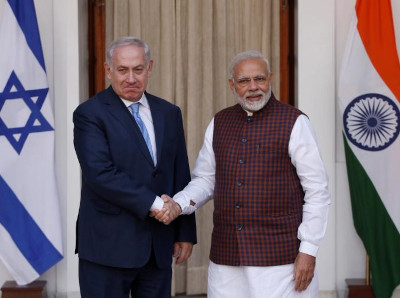
In 2008, the Manmohan Singh government got Israeli material support, enabling India to move from targeted to mass surveillance capabilities. In February 2014, a work agreement was signed between the Israeli Ministry of Public Security and India’s Ministry of Home Affairs to obtain, among other things, training by Israel of Indian police and security personnel for border management, ‘counterterrorism’, and crowd control. This was first implemented when the Modi government took over after the May 2014 elections, and such arrangements subsequently were further developed and extended. The BJP-led governments of Vajpayee and Modi added an emotional-ideological dimension to the supposedly strategic contours of this bilateral relationship because of the kinship character of Hindutva and Zionism as belief-systems. But where Israel from inception has legally been a ‘Jewish’ Nation and State, the Sangh Parivar and BJP have still to reach their goal of establishing a proper ‘Hindu’ Nation and State. Moreover, while Israel has made itself the dominant military and nuclear force in the WANA region, India has not been able to do so in South Asia because of Pakistan and China. The ways in which Israel has contained the Palestinians in the OTs is seen as providing lessons for what the Modi government should do in Kashmir.
It is no surprise then that there has been a qualitative deepening of India-Israel ties under BJP rule, especially during the last ten years of Modi in power. Even Indian lip service for Palestine has at times been quite absent as political-diplomatic approval of Israel’s behaviour is more frequently and openly declared. In the latest war on Gaza, the Modi government has never directly criticized, let alone condemned, Israel for its behaviour or called out its genocide. The most that New Delhi will do is occasionally call for a ‘humanitarian ceasefire’ and repeat meaningless assertions about supporting a ‘two-state solution’. Meanwhile, Indian public and private companies provide explosives, munitions, and drones to Israel, and there is recruitment of Indian migrant workers to replace outlawed Palestinian workers in Israel.
Indian TV channels, for the most part, are so controlled and influenced by the government that their performance when it comes simply reporting leave aside criticising what is happening in Gaza and the WB, is far worse than in the public electronic media in the US. In the last Lok Sabha before the latest elections, there were some 37 parties represented. Of these, 29 said nothing about the Israel-Palestine issue even as this horrific tragedy was unfolding in Gaza. These parties have believed that remaining silent does no harm to their domestic standing and popularity, while speaking out could very well damage them by leaving them open to the charge of ‘Muslim appeasement’ even though this conflict is not a ‘Muslim’ issue. Nevertheless, that there is such widespread abstention by so many political parties is an indication of how communalised Indian politics and society are today.
One Demand Better
At least some civil society organisations and the mainstream left parties have voiced their condemnation of Israel and taken solidarity actions in support of the Palestinian people and Gazans in particular. Individual leaders in the Congress have voiced their anger at what Israel is doing, but the party itself, except in Kerala where it must contest the Left Front as well as win over Muslim groups, has not sought to carry out mass demonstrations or cooperate with other political forces in joint solidarity actions. In Congress-ruled Karnataka, both in October 2023 and June 2024, police in Bengaluru have stopped public solidarity actions in favour of Palestine. It should be noted that only pro-Palestine and the Left parties (not the Congress or other bourgeois parties) have supported the Boycott, Divestment and Sanctions (BDS) Campaign against Israel, which has achieved notable success in many parts of the world by causing a degree of material discomfort to Israel. But the more important impact of BDS has been its relative success in undermining Israel’s political credibility and legitimacy. The boycott weapon was important in discrediting South African apartheid; it is important in the current context as well.
Given the ideological kinship of Zionism and Hindutva, the greater the extent to which Zionism is exposed and condemned for its inherently racist and discriminatory character, the better it is for the struggle to discredit Hindutva and its various political advocates. This is why the Indian Left must prioritise solidarity for the Palestinian cause. The latest demand called by the CPI(M), CPI, CPI-ML (Liberation), AIFB, and the RSP on the Indian government vis-à-vis Israel has highlighted the need to prevent Indian military arms and ammunition supplies to Israel, to end Indian exports of arms from Israel, and to end all forms of complicitly by India with Israel’s illegal occupation and genocide.
The Indian Left should go one demand better. It should call on the Indian government to sever all political, diplomatic, economic, technological, socio-cultural, academic, and military relationships with Israel, full stop. Indian citizens in Israel should then be called back except for those who want, and are able, to get Israeli citizenship. That is how an earlier India treated the apartheid regime of South Africa. It is how it should treat an Israeli whose apartheid regime has been, in its exercise of ‘Bantustan-type’ policies, crueller and more vicious than South Africa ever was.
Of course, the Indian government will not do this. But that should not stop the Indian Left from demanding it. In doing so, it will be taking a moral-political stance expressing a much greater integrity than that displayed either by Russia or China in their respective relations with Israel. These two big powers are mentioned here because, unlike in the case of the criminal behaviour of the US, their crimes are sometimes whitewashed by different sections of the Indian Left. But more importantly, such a stand would be in keeping with the best traditions of revolutionary socialist internationalism! •
This article first published on the Europe Solidaire Sans Frontières website.


